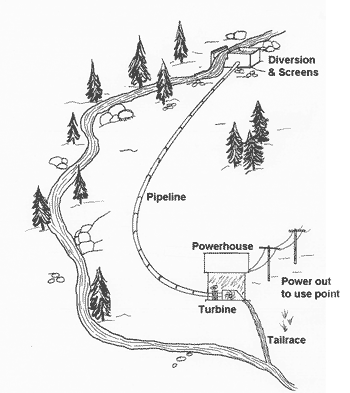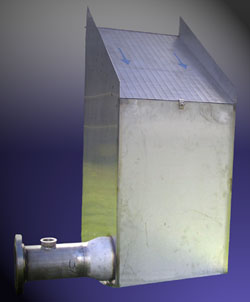Major Components of a Hydro System
Bookmark this page (Ctrl+D)
![]() View/Print PDF Version
View/Print PDF Version
Guide Navigation

Major components of a hydro system include a water diversion, pipeline to create pressure, turbine & generator, tailrace for exiting water, and transmission wires.
A hydro system is a series of interconnected components: water flows in one end, and electricity comes out the other. This section provides a high-level overview of these components, from the water source to voltage and frequency controls.
Water Diversion (Intake)
The intake is typically the highest point of your hydro system, where water is diverted from the stream into the pipeline that feeds your turbine. In many cases a small dam is used to divert the water. (In most large hydro projects, the dam also creates the HEAD necessary to drive the turbine.)
A water diversion system serves two primary purposes. The first is to provide a deep enough pool of water to create a smooth, air-free inlet to your pipeline. (Air reduces horsepower and can cause damage to your turbine.) The second is to remove dirt and debris. Screens can help stop larger debris such as leaves and limbs, while an area of “quiet water” will allow dirt and other sediment to settle to the bottom before entering your pipeline. This helps reduce abrasive wear on your turbine.
Pipeline (Penstock)

This stainless steel intake system includes a self-cleaning screen.
The pipeline, sometimes called the penstock, is responsible for not only moving water to your turbine, but is also the enclosure that creates Head pressure with increasing vertical drop. In effect, the pipeline focuses all the water power at the bottom of the pipe where your turbine will connect. In contrast, an open stream dissipates the energy as it travels down the hill.
Pipeline diameter, length, and routing all affect efficiency, and there are guidelines for matching the size of your pipeline to the Design FLOW of your system. As you’ll see later, a small-diameter pipeline can considerably reduce your available horsepower, even though it can carry all available water. Larger diameter pipelines create less friction as the water travels through.
Powerhouse
The powerhouse is simply a building that houses your turbine, generator and controls. Proper design significantly affects system efficiency, however, especially with regard to how the water enters and exits your turbine.